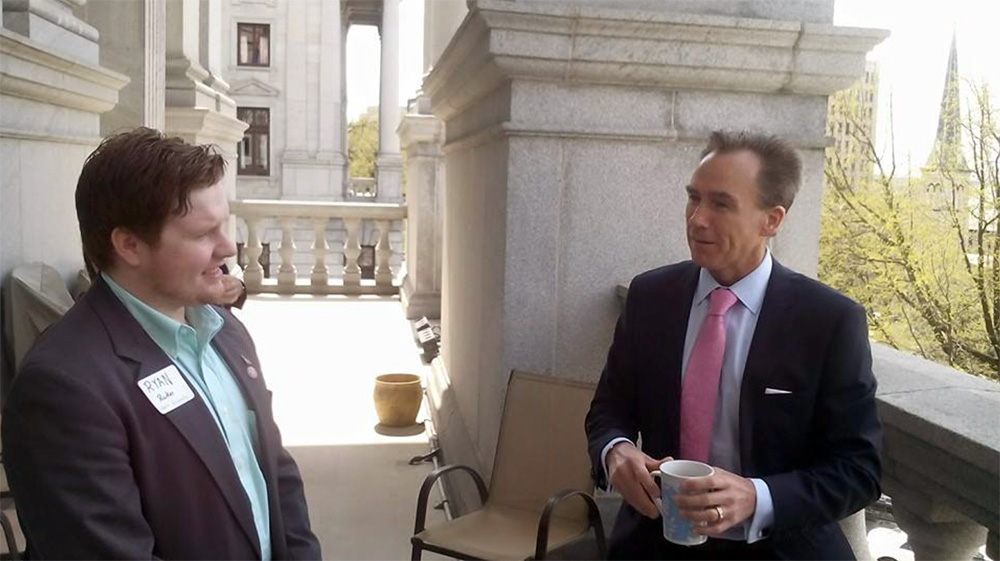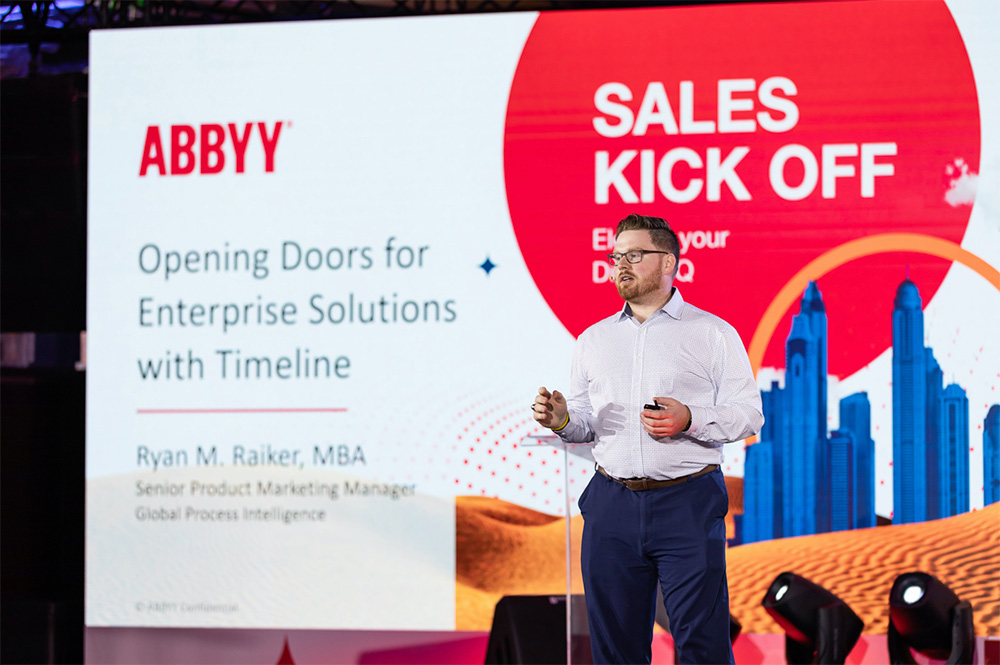We caught up with Ryan after seeing a recent interview featured in The Hudson Weekly. While careers seem to evolve over time, Ryan had a unique change we felt would be an interesting story for the Ritz Herald reader community. Ryan spent several years working in state and local government, mostly in improving citizen engagement, analyzing processes, and helping government agencies perform more efficiently and effectively. In 2017 Ryan made a change, leaving public service for a startup. He has been catching attention as a mover and shaker in the marketing and technology space ever since.
I sat down with Ryan this afternoon to ask him about the change of industry and discuss what drove his decision making. Here are highlights:
Thinking back to you career in the public sector, what made you leave?
I think the biggest thing that had me thinking of a career outside of government was the lack of change. Everything in government seemed slow. It felt stale and dry. While I have a huge passion for all things tech, there wasn’t enough digital modernization in my experiences. I mean I was working with people who were still using paper and pen to record constituent service requests. Sure, we implemented Philly 311 to provide access to non-emergency city services, but old habits die slow in government. Oftentimes, projects last years, fail to deliver a positive return on investment, and are many times simply nice press conference points or campaign promises that never actually realize their potential.
Today, when I and my team make a deliverable promise, we do it. When we announce ROI goals, we aim for them and we continue to work toward them. We fail fast and we recalibrate and fix things at a moment’s notice. In my public sector experiences, we needed to have a dozen meetings, a hand full of change requests if not more, legislative approval, and an endless, infinite budget to do what seemed like the simplest of technology projects. I hope it’s not the same still, but I know what we’ve done in my team in one year in the private sector might be 5 years of accomplishments in the public sector.
It doesn’t have to be that way, but there’s often little to no motivation to change that. For that reason, I needed to look for a place for me to do more. I needed to have big visions for the future, fast failures to learn from, and opportunities to make wins and make them often. The private sector helped me find that.
Did you plan your career pivot to move from the public sector to marketing?
No, actually rather the contrary. Candidly I think I’ve always been quite good at marketing. My background in analytics and process improvement certainly helps me understand buyer behaviors, customer analytics, and ways to improve workflow in marketing. However, when I started my role at the technology startup TimelinePI I was a Solutions Consultant, basically a sales engineer. Now if you would have told me I was going to be a “sales and marketing dude,” I would have laughed you out of the room.
I suppose I was always around sales and marketers and maybe I was doing some of that in my consulting business, but to think my target would be to lead a digital marketing team at a global company was far from what I was thinking. It all kind of just happened.

Ryan Raiker with Former Lieutenant Governor of Pennsylvania Mike Stack on the balcony of the Pennsylvania State Capitol Building – April 2015
If you didn’t plan to be a marketer what happened?
TimelinePI was founded in 2015 and development on the technology began. In that year I was focused on a handful of clients and working to improve citizen services in the City of Philadelphia. It wasn’t until 2017 I joined the Timeline team full time. I joined the process mining tech startup almost entirely based on my entrepreneurial spirit. When I started, we didn’t have a single customer, a product datasheet, or for what it’s worth a website that wasn’t just a PowerPoint slide.
The cofounders, Scott Opitz and Alex Elkin, had been involved in several successful software companies prior. When we started talking about what TimelinePI could be (also perhaps what it has become today), it was everything I desired and was the opposite of my work in government. It was fast, it was innovative, and more importantly: challenging in a whole new entrepreneurial way. I’d like to think the startup had three exits – acquisition by a larger software company – what happened, a public offering – unlikely, and failure – frankly not an option; at least it wasn’t in my eyes. I liked the idea of a startup – fast-paced, agile decision-making, and the opportunity to grow something.
The journey went something like this:
I left the public sector to become a solutions consultant. While demoing the software wasn’t my favorite, I was instead tasked to build the TimelinePI website, the marketing materials, and the content that helped evangelize and promote process mining. At that time, process mining was almost unknown to the North American market but most definitely poised for growth. I became the startup’s marketing manager, and we brought on a small team to grow the marketing team. In 2019 we were acquired and ABBYY needed a product marketing manager to lead education and adoption of Timeline Process Intelligence around the world. It was only a few short months later I was asked to lead Digital Marketing for ABBYY and transform the global web and content strategy.

Ryan presenting in Dubai, United Arab Emirates to ABBYY’s global sales teams – January 2020.
A little over a year later and here we are – ABBYY has pivoted from a capture and OCR company to a leading Digital Intelligence company. We empower organizations to gain a complete understanding of their business processes and the content that fuels them.
As a part of our new focus, we recently rebranded. The redesign preserves and refreshes our brand’s legacy. ABBYY is an established company recognized for its technical acumen, but as the company has evolved and now offers more comprehensive solutions for higher value use cases, the new brand identity evokes this transformation.
Aside from that we have an entirely redesigned corporate website, and launched a microsite dedicated to our desktop applications business: PDF.abbyy.com. We have realigned our localized languages to ones reflective of our new business and we now maintain nearly 100% local language translation on the web in our core markets.
We’ve come a long way, but I’m certain we’re not done yet.
Where do you see yourself heading next? Do you think you might peek back into the public sector?
I don’t think in the near term. Marketing is just too damn fun right now! I’ll never say never, but I don’t know where I’ll be next. I do know one thing for sure right now – I’m glad to be here at ABBYY!
I have a great team. We have amazing leadership. Our development team members are artificial intelligence and machine learning geniuses. Our technology is transformative. We are on the bleeding edge of the intelligent automation trend. Our roadmap looks promising, and we are in a growing space. It’s quite remarkable to be a part of all of this, and I don’t know that I’d find the same pace and enthusiasm back in government.

Ryan with the White House Press Pool at Former 1st Lady Michelle Obama speaking event in Philadelphia, PA – August 2012.
What advice would you give someone else like yourself who might want to switch from working in the public sector to a career in the private sector?
I think a big thing to realize is you need to completely change your mindset in terms of embracing workplace culture when switching to the private sector from the public sector. Private business has a large focus on being profit-driven and in the startup, we moved fast, we failed fast, and we had very little bureaucratic restrictions. We also had very little support – a shoestring budget, small teams, and limited time.
If you’re not quite ready to make the shift and need some more time to think, I encourage you to start thinking differently. You should consider each and every citizen as a customer. Their opinion matters, their experience must be frictionless, and their transactions need to happen efficiently. This mentality will help you better understand the demand of the private sector, or moreover, a startup where each customer acquired means you have a job tomorrow and that job could be incredibly rewarding.
Ryan is without a doubt someone to watch. I expect this won’t be the last we hear from him. You can connect with him on LinkedIn, follow him on Twitter, or check out RyanRaiker.com for other updates.





